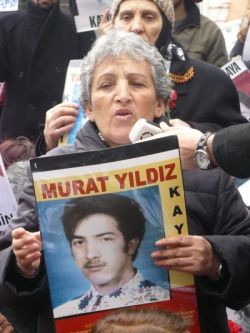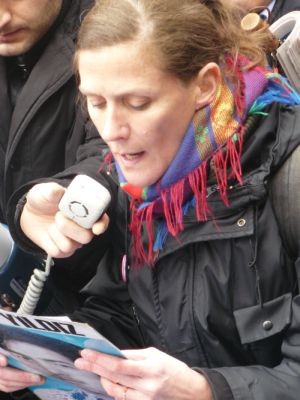“Saturday Mothers”: Government Must Find Bodies of Disappeared
They were supported by members of the Istanbul branch of the Human Rights Association (IHD), Democratic Society Party (DTP) MP Sebahat Tuncel, who is part of the Committee for those lost in detention, dancer Zeynep Tanbay, activist Garo Paylan, journalist Nadire Mater, and publishers Ragıp Zarakolu and Necati Abay.
Existence of mass graves and "death wells"
The protesters demanded that mass graves and the acid wells of the Turkish Pipeline Corporation BOTAŞ be opened.
In recent weeks, the investigation into the illegal ultranationalist Ergenekon organisation has brought to light information and rumours about sites of mass graves.
 Relatives
of around 50 people who disappeared took part in the silent sit-down protest.
Hanife Yıldız spoke, saying that she had taken her son Murat to the police
station herself before he disappeared: “We have appealed to the state and to
humanity until today, but the state did not hear us. The carnations and flowers
we were given for years have dried in our hands.”
Relatives
of around 50 people who disappeared took part in the silent sit-down protest.
Hanife Yıldız spoke, saying that she had taken her son Murat to the police
station herself before he disappeared: “We have appealed to the state and to
humanity until today, but the state did not hear us. The carnations and flowers
we were given for years have dried in our hands.”
"They said he jumped into the sea"
“My son was wanted for a judicial reason. I myself took him and a lawyer to the Bornova police station. When I went back to ask about my son, they told me that they had taken him to Istanbul by ferry to let him show them a gun. They said that he jumped into the sea. I don’t believe it.”
Then DTP MP Tuncel spoke, saying that the Ergenekon trial was turning into a trial of discharges. She demanded the opening of BOTAŞ wells in Silopi, a district in the Kurdish-majority province of Şırnak, in the southeast of Turkey, as well as the opening of mass graves. She said that a struggle for democracy could only begin if Turkey’s dark side became known.
"The state is hiding the truth"
 Representing
the Istanbul branch of IHD, dancer Zeynep Tanbay read a press statement. She
said that although the Ergenekon investigation was not extensive enough, it was
important because some truths and confessions were being heard from members of
official state organs.
Representing
the Istanbul branch of IHD, dancer Zeynep Tanbay read a press statement. She
said that although the Ergenekon investigation was not extensive enough, it was
important because some truths and confessions were being heard from members of
official state organs.
Referring to the identification of three more people in Diyarbakır as members of the Bulut family, after the family had been denied information for years, Tanbay added: “The demands to open the ‘death wells’ and mass graves have been rejected so far. Through this rejection, the state is aiming to hide the truth.”
She referred to a similar situation in Italy, saying “Millions of people in Italy marched against Gladio and brought the organisation down. If our number increases, then this dirty structure, which has murdered our people, lost our people in detention, burnt our villages and raped people, will be brought down.”
Movement began in 1995
The Saturday Mothers protests started in 1995, when Emine Ocak’s son Hasan Ocak disappeared in detention. His body was found in a graveyard for the poor 55 days later, and it bore evidence of torture. The protests continued from 1995 to 1999, the last seven months being marked by harrassment by security forces. Many Saturday mothers were detained regularly.
Some of the cases which the relatives of the disappeared have brought have been taken to the European Court of Human Rights, and Turkey has been convicted. (EÖ/AG)









